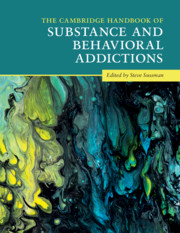Book contents
- The Cambridge Handbook of Substance and Behavioral Addictions
- The Cambridge Handbook of Substance and Behavioral Addictions
- Copyright page
- Contents
- Figures
- Tables
- Contributors
- Foreword
- Preface
- Acknowledgements
- Part I Concepts of Addiction
- Part II Clinical and Research Methods in the Addictions
- Part III Levels of Analysis and Etiology
- Part IV Prevention and Treatment
- Part V Ongoing and Future Research Directions
- 24 Precision Behavioral Management (PBM): A Novel Genetically Guided Therapy to Combat Reward Deficiency Syndrome (RDS) Relevant to the Opiate Crisis
- 25 Novel Psychoactive Substances: A New Challenge for Prevention and Treatment
- 26 Impaired Physicians
- 27 Feedback Models for Gambling Control: The Use and Efficacy of Online Responsible Gambling Tools
- 28 Food versus Eating Addictions
- 29 Measurement, Prevention, and Treatment of Exercise Addiction
- 30 Tanning as an Addiction: The State of the Research and Implications for Intervention
- 31 Considering the Overlap and Nonoverlap of Compulsivity, Impulsivity, and Addiction
- 32 Anhedonia in Addictive Behaviors
- 33 Mindfulness-Based Interventions Applied to Addiction Treatments
- 34 American Legal Issues in Addiction Treatment and Research
- Index
- References
24 - Precision Behavioral Management (PBM): A Novel Genetically Guided Therapy to Combat Reward Deficiency Syndrome (RDS) Relevant to the Opiate Crisis
from Part V - Ongoing and Future Research Directions
Published online by Cambridge University Press: 13 July 2020
- The Cambridge Handbook of Substance and Behavioral Addictions
- The Cambridge Handbook of Substance and Behavioral Addictions
- Copyright page
- Contents
- Figures
- Tables
- Contributors
- Foreword
- Preface
- Acknowledgements
- Part I Concepts of Addiction
- Part II Clinical and Research Methods in the Addictions
- Part III Levels of Analysis and Etiology
- Part IV Prevention and Treatment
- Part V Ongoing and Future Research Directions
- 24 Precision Behavioral Management (PBM): A Novel Genetically Guided Therapy to Combat Reward Deficiency Syndrome (RDS) Relevant to the Opiate Crisis
- 25 Novel Psychoactive Substances: A New Challenge for Prevention and Treatment
- 26 Impaired Physicians
- 27 Feedback Models for Gambling Control: The Use and Efficacy of Online Responsible Gambling Tools
- 28 Food versus Eating Addictions
- 29 Measurement, Prevention, and Treatment of Exercise Addiction
- 30 Tanning as an Addiction: The State of the Research and Implications for Intervention
- 31 Considering the Overlap and Nonoverlap of Compulsivity, Impulsivity, and Addiction
- 32 Anhedonia in Addictive Behaviors
- 33 Mindfulness-Based Interventions Applied to Addiction Treatments
- 34 American Legal Issues in Addiction Treatment and Research
- Index
- References
Summary
Reward Deficiency Syndrome (RDS) is an umbrella term for all drug and nondrug addictive behaviors, due to a dopamine deficiency, “hypodopaminergia.” There is an opioid-overdose epidemic in the USA, which may result in or worsen RDS. A paradigm shift is needed to combat a system that is not working. This shift involves the recognition of dopamine homeostasis as the ultimate treatment of RDS via precision, genetically guided KB220 variants, called Precision Behavioral Management (PBM). Recognition of RDS as an endophenotype and an umbrella term in the future DSM 6, following the Research Domain Criteria (RDoC), would assist in shifting this paradigm.
Keywords
- Type
- Chapter
- Information
- The Cambridge Handbook of Substance and Behavioral Addictions , pp. 297 - 306Publisher: Cambridge University PressPrint publication year: 2020
References
- 43
- Cited by

